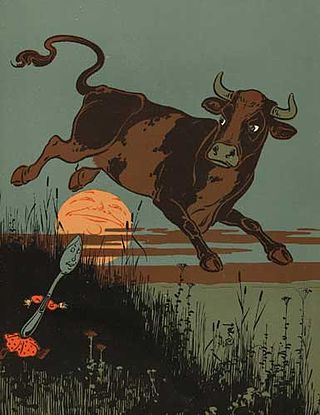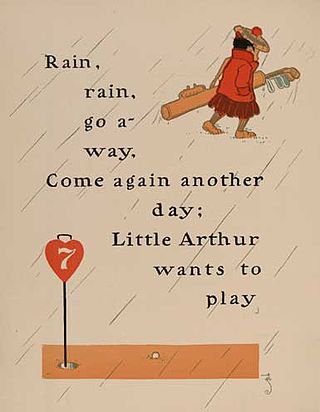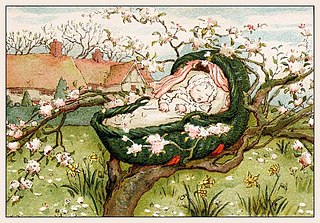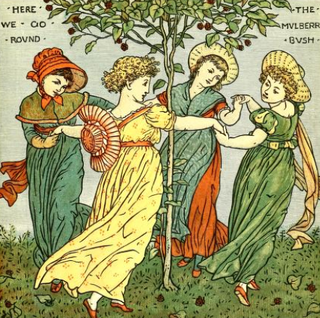
A nursery rhyme is a traditional poem or song for children in Britain and other European countries, but usage of the term dates only from the late 18th/early 19th century. The term Mother Goose rhymes is interchangeable with nursery rhymes.

Humpty Dumpty is a character in an English nursery rhyme, probably originally a riddle and one of the best known in the English-speaking world. He is typically portrayed as an anthropomorphic egg, though he is not explicitly described as such. The first recorded versions of the rhyme date from late eighteenth-century England and the tune from 1870 in James William Elliott's National Nursery Rhymes and Nursery Songs. Its origins are obscure, and several theories have been advanced to suggest original meanings.

James Orchard Halliwell-Phillipps was an English Shakespearean scholar, antiquarian, and a collector of English nursery rhymes and fairy tales.

"Ladybird, Ladybird" is the first line of an English-language nursery rhyme that also has German analogues. It is included in the Roud Folk Song Index as number of 16215.

"Hey Diddle Diddle" is an English nursery rhyme. It has a Roud Folk Song Index number of 19478.

"Rub-a-dub-dub" is an English language nursery rhyme first published at the end of the 18th century in volume two of Hook's Christmas Box under the title "Dub a dub dub" rather than "Rub a dub dub". It has a Roud Folk Song Index number of 3101.

"Rain, Rain, Go Away" is a popular English language nursery rhyme. It has a Roud Folk Song Index number of 19096 and many different variations of it have been recorded.

"Solomon Grundy" is an English nursery rhyme. It has a Roud Folk Song Index number of 19299.

"One, Two, Buckle My Shoe" is a popular English language nursery rhyme and counting-out rhyme of which there are early occurrences in the US and UK. It has a Roud Folk Song Index number of 11284.

"There Was a Crooked Man" is an English nursery rhyme. It has a Roud Folk Song Index number of 1826.
Needles and Pins may refer to:
Hot Cross Buns was an English street cry, later perpetuated as a nursery rhyme and an aid in musical education. It refers to the spiced English confection known as a hot cross bun, which is associated with the end of Lent and is eaten on Good Friday in various countries. The song has a Roud Folk Song Index number of 13029.

"Rock-a-bye baby on the tree top" is a nursery rhyme and lullaby. It has a Roud Folk Song Index number of 2768.

"Monday's Child" is one of many fortune-telling songs, popular as nursery rhymes for children. It is supposed to tell a child's character or future from their day of birth and to help young children remember the seven days of the week. As with many nursery rhymes, there are many versions. It has a Roud Folk Song Index number of 19526.
"Marco Polo" is the 60th episode of the HBO original series The Sopranos and the eighth of the show's fifth season. Written by Michael Imperioli and directed by John Patterson, it originally aired on April 25, 2004.
"Taffy was a Welshman" is an English language nursery rhyme which was popular between the eighteenth and twentieth centuries. It has a Roud Folk Song Index number of 19237.

"Here We Go Round the Mulberry Bush" is an English nursery rhyme and singing game. It has a Roud Folk Song Index number of 7882. It uses the tune which Nancy Dawson danced into fame in The Beggar's Opera in mid-1700s London. The same tune is also used for "Lazy Mary, Will You Get Up" and "Nuts in May". A variant is used for "The Wheels on the Bus".

"Girls and Boys Come Out to Play" or "Boys and Girls Come Out to Play" is a nursery rhyme that has existed since at least 1708. It has a Roud Folk Song Index number of 5452.
"There was an old woman lived under a hill" is a nursery rhyme which dates back to at least its first known printing in 1714. It has a Roud Folk Song Index number of 1613.
This page is based on this
Wikipedia article Text is available under the
CC BY-SA 4.0 license; additional terms may apply.
Images, videos and audio are available under their respective licenses.














